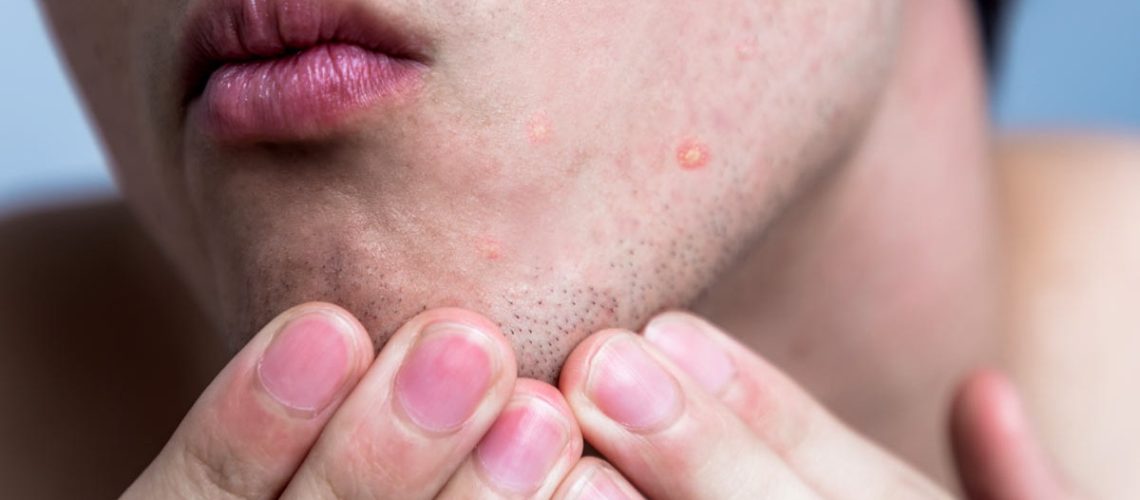
Did you know that the annoying skin issue of acne can be linked to your testosterone levels? While acne can be triggered by multiple factors like a bacterial infection, Vitamin D deficiency etc, an imbalance in hormone levels has often been found to be responsible as well.
Let’s understand whether fluctuations in your testosterone level can irritate your skin leading to acne, and how to treat your hormonal acne.
How Does Testosterone Trigger Acne?
Hormonal imbalance and a high level of testosterone hormone can cause acne in both men and women right from adolescence to adulthood. This sex hormone is produced by the testes (in men) and ovaries (in women in a small amount).
It plays a vital role in developing masculine characteristics in men, regulating sex drive and fertility for both sexes and affecting a person’s mood .
Testosterone can trigger acne by stimulating sebum production. Sebum is an oily substance produced in the sebaceous glands of your skin. Your face contains a large number of sebaceous glands, so the excess secretion of sebum blocks your skin pores.
These clogged pores can trap dead skin cells, dirt, bacteria, and other particles, causing inflammation and reddish bumps that are commonly known as acne.
Therefore, excess testosterone production can lead to excessive sebum production, which, in turn, can trigger an outbreak of facial zits.
As overproduction of testosterone can influence excessive sebum production, there is a high chance that a greater level of this steroid hormone can inflame sebaceous glands. This in turn can trigger an acne outbreak.
Also while a low testosterone level does not influence acne, treatment with testosterone supplements may cause acne as a side effect.
A 2011 study titled An update on the role of the sebaceous gland in the pathogenesis of acne showed that acne patients produce higher rates of testosterone in the skin than healthy individuals. Results of another study questioning Is acne a sign of androgen excess disorder or not ? also supported the fact.
Here researchers observed the hormone levels of 207 women with acne (from 18 to 45 years of age) and found that 72% of the subjects had excess androgen hormones, including testosterone.
What Causes Testosterone Levels To Drop/Raise?
Like other sex hormones, testosterone levels also fluctuate throughout life due to various factors like age, environmental factors, etc.
While testosterone levels in both boys and girls tend to rise during adolescence, they start dropping after the age of 30. Other reasons that influence the drop and rise of testosterone are listed below:
Causes For Drop In Testosterone
Usually, the testosterone level in men drops with age. According to a report by the American Urological Association, about 40% of men aged 45 years or more have low testosterone levels. Here are some other factors that can cause a drop in the testosterone level in men.
Though low testosterone level doesn’t result in any breakout, multiple other issues such as sexual dysfunction, erectile dysfunction, hair loss, mood swings, fatigue, increased body fat, etc can happen.
Causes For Raise Of Testosterone
For some men, the increase in testosterone levels is hereditary in nature. People with such a genetic predisposition have an increased risk of stroke, cardiovascular disease, etc. Another probable cause of excess testosterone in men is a testicular or adrenal tumor.
Even a benign tumor in those body parts can drastically increase testosterone levels. Long-term use of certain steroids can also raise your testosterone to unhealthy levels.
In women, polycystic ovary syndrome can increase testosterone levels. Besides triggering acne, high testosterone levels can cause several critical health issues like developing blood clots, heart disease, and different cardiovascular problems.
How To Keep Testosterone Levels Steady
First, you need to adopt a healthy lifestyle to keep your testosterone level steady. A few simple lifestyle changes that can make a significant difference include,
© 2023 DWA HERBALS. All Rights Reserved. Designed by NXlogy